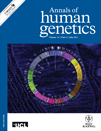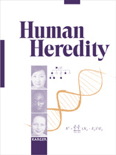
GENETIC EPIDEMIOLOGY
Scope & Guideline
Transforming Health Outcomes with Genetic Insights
Introduction
Aims and Scopes
- Genetic Association Studies:
The journal publishes research on genetic association studies that identify genetic variants associated with various diseases and traits, often utilizing genome-wide association studies (GWAS) to explore genetic risk factors. - Mendelian Randomization:
A significant focus is placed on Mendelian randomization techniques, which use genetic variants as instrumental variables to infer causal relationships between exposures (like lifestyle factors) and outcomes (such as diseases). - Genetic Epidemiology of Complex Traits:
Research in this area investigates the genetic architecture of complex traits, including polygenic risk scores, gene-environment interactions, and the heritability of traits across diverse populations. - Integration of Multi-Omics Data:
The journal emphasizes studies that integrate genetic data with other omics data (e.g., transcriptomics, proteomics) to gain a comprehensive understanding of biological pathways influencing health. - Population Diversity and Genetics:
Research that addresses genetic diversity among populations, including studies on admixed populations and transancestry analyses, is a core area, reflecting the journal's commitment to inclusivity in genetic research. - Ethical, Legal, and Social Implications (ELSI):
The journal also explores the ethical, legal, and social implications of genetic research, particularly in the context of gene-environment interactions and public health.
Trending and Emerging
- Machine Learning and AI in Genetic Research:
There is a growing trend towards utilizing machine learning and artificial intelligence techniques to analyze genetic data, enhance predictive models, and identify novel genetic associations. - Gene-Environment Interactions:
Research on gene-environment interactions is gaining prominence, reflecting an increased interest in understanding how environmental factors and genetic predispositions jointly influence health outcomes. - Polygenic Risk Scores and Predictive Modeling:
The development and application of polygenic risk scores for predicting disease risk across diverse populations are trending, enabling personalized medicine approaches. - Integration of Genomic and Clinical Data:
There is an emerging focus on integrating genomic data with electronic health records and biobanking resources to enhance the understanding of genetic underpinnings of diseases in real-world settings. - Ethical Considerations in Genetic Research:
Research addressing the ethical implications of genetic studies, particularly in diverse populations and regarding data privacy, is becoming increasingly relevant. - Longitudinal and Multi-Omics Studies:
There is a trend towards longitudinal studies that incorporate multi-omics data to uncover the dynamics of genetic influence over time, providing deeper insights into disease progression and risk.
Declining or Waning
- Traditional Statistical Methods:
There seems to be a decline in the use of traditional statistical methods for genetic association analysis, as more sophisticated machine learning and Bayesian approaches gain traction. - Single Phenotype Studies:
Research focusing exclusively on single phenotypes is becoming less common, with a notable shift towards multi-phenotype analyses that capture the complexity of genetic interactions and their impact on health. - Basic Genetic Mapping Techniques:
Basic genetic mapping techniques are waning in favor of more advanced methods that incorporate multi-omics data and sophisticated computational frameworks, leading to a decrease in publications centered on conventional mapping. - Clinical Trials Focused Solely on Genetic Factors:
Studies that focus exclusively on the genetic factors of diseases without considering environmental or social determinants are less frequently published, indicating a broader understanding of health determinants.
Similar Journals

Genes and Nutrition
Bridging Genetics and Nutrition for Better HealthGenes and Nutrition is a prominent open access journal published by BMC in the United Kingdom, dedicated to advancing knowledge at the intersection of nutrition, genetics, and human health. With the aim of making cutting-edge research available to a global audience, the journal has been a vital platform for sharing discoveries since its inception in 2007, and it continues to thrive with a convergence period extending to 2024. Recognized for its high-quality contributions, Genes and Nutrition is rated in the Q2 category within both Endocrinology, Diabetes, and Metabolism and Genetics as of 2023, reflecting its esteemed position in these fields (Scopus Ranks leaderboard places it at #72/244 and #109/347, respectively). This journal is an invaluable resource for researchers, professionals, and students alike, fostering collaboration and innovation in the understanding of how genetic factors influence nutrition and health outcomes. Accessible to all since 2016, it encourages dialogue and discovery, positioning itself as a leader in genetic and nutritional science.

Frontiers in Genetics
Connecting Researchers to the Future of GeneticsFrontiers in Genetics is a premier academic journal dedicated to advancing the field of genetics through high-quality, peer-reviewed research. Published by FRONTIERS MEDIA SA in Switzerland since 2010, this Open Access journal provides a platform for researchers and practitioners to disseminate innovative findings across various subfields, including clinical genetics and molecular medicine. With a notable emphasis on interdisciplinary approaches, the journal holds a strong position in the academic landscape, achieving Q2 rankings in key categories such as Genetics and Molecular Medicine in 2023. Not only does Frontiers in Genetics contribute to the scholarly dialogue by publishing impactful studies, but it also promotes accessibility to vital research, ensuring that knowledge is available to a global audience. This journal is a vital resource for researchers, professionals, and students looking to stay at the forefront of genetic discoveries and their applications, reflective of its engagement with contemporary challenges in genetics and healthcare.

Human Genome Variation
Exploring the Depths of Genetic DiversityHuman Genome Variation, published by SpringerNature, is an esteemed open access journal dedicated to the field of genetic research and exploration. Since its inception in 2014, the journal has been at the forefront of advancing our understanding of human genome diversity and its implications in health and disease. With an E-ISSN of 2054-345X, it features a diverse array of studies that encompass biochemistry, genetics, and molecular biology, making it an invaluable resource for researchers and professionals alike. The journal holds a Q3 ranking in both biochemistry and genetics, and a Q4 ranking in molecular biology, highlighting its growing influence within these disciplines. As the landscape of genomics continues to evolve, Human Genome Variation serves as a platform for the dissemination of high-quality research, fostering collaboration and innovation within the scientific community. Researchers and academics are invited to contribute to this pivotal journal, which not only provides open access to its content since 2014 but also aims to bridge the gap between basic research and clinical applications in genetics.

Genetic Testing and Molecular Biomarkers
Advancing the Future of Genetic Research.Genetic Testing and Molecular Biomarkers, an esteemed journal published by MARY ANN LIEBERT, INC, serves as a pivotal platform for advancing the field of genetic research and its applications in medicine. Focused on the innovative intersections of genetics and biomarker discovery, this journal has consistently contributed meaningful insights since its inception in 2009, with its scope evolving through 2024. With an ISSN of 1945-0265 and an E-ISSN of 1945-0257, it offers both traditional and open access options to cater to a broad audience of researchers, professionals, and students. Despite its current classification in the Q4 and Q3 quartiles for Genetics (clinical) and Medicine (miscellaneous) respectively, the journal remains committed to publishing high-quality, peer-reviewed articles that push the boundaries of knowledge in the field. As the landscape of genomic medicine continues to expand, Genetic Testing and Molecular Biomarkers is positioned as a crucial resource for disseminating cutting-edge discoveries and fostering interdisciplinary collaboration.

ANNALS OF HUMAN GENETICS
Advancing the Frontiers of Human GeneticsANNALS OF HUMAN GENETICS is a distinguished peer-reviewed journal extensively covering the field of genetics, published by Wiley. Established in 1954 and extending its influence into 2024, this journal features comprehensive research articles, reviews, and case studies aimed at advancing our understanding of human genetic conditions and their implications on health. With its ISSN number 0003-4800 and E-ISSN 1469-1809, the journal has carved a prominent niche within the academic community, currently ranking in the third quartile in both genetic and clinical genetics categories (Q3, 2023). Its Scopus rankings reflect its credibility, placing it #54 out of 99 in clinical genetics. Though it is not open access, it remains an essential resource for researchers and practitioners seeking to explore the latest findings and methodologies in genetics, serving as a critical platform for knowledge dissemination and dialogue within the scientific community. As we delve deeper into the complexities of our genetic makeup, the ANNALS OF HUMAN GENETICS continues to play a vital role in fostering innovation and collaboration in this ever-evolving field.

THEORETICAL AND APPLIED GENETICS
Driving discoveries in agronomy and crop science.THEORETICAL AND APPLIED GENETICS, published by Springer, is a premier journal that has significantly contributed to the fields of Agronomy, Crop Science, Biotechnology, and Genetics since its inception in 1933. With a solid reputation reflected in its Q1 ranking across multiple disciplines for 2023, this journal provides a vital platform for the dissemination of high-quality research that advances our understanding of genetic principles and their applications in agriculture and biology. The journal's indexed status and high impact factor indicate its vital role in shaping contemporary genetic research, marking it as an essential resource for researchers, professionals, and students seeking to stay at the forefront of these dynamic fields. Although it currently does not offer Open Access options, the journal ensures that quality studies are accessible through institutional subscriptions, supporting an informed community of scientists dedicated to innovation in genetics and applied biological sciences.

HUMAN HEREDITY
Decoding the Blueprint of Human HeredityHUMAN HEREDITY is a peer-reviewed journal published by KARGER, dedicated to advancing the understanding of genetics and inherited traits in human populations. Established in 1950, this journal has become a vital resource for researchers, professionals, and students in the fields of genetics and clinical genetics, currently categorized in the third quartile (Q3) for both general and clinical genetics as of 2023. With an ISSN of 0001-5652, HUMAN HEREDITY provides rigorous academic content that analyzes heredity patterns and genetic variations, aiming to illuminate the complexities of human genetic inheritance. Although it does not operate on an open access model, the journal offers a comprehensive collection of studies and insights that are crucial for genetic research and clinical applications. Situated in Basel, Switzerland, HUMAN HEREDITY contributes to the global dialogue in genetics, making it an essential platform for those seeking to enrich their understanding of human heredity in a rapidly evolving scientific landscape.

GENETICS SELECTION EVOLUTION
Advancing the Frontiers of Evolutionary GeneticsGENETICS SELECTION EVOLUTION is a prominent open-access journal published by BMC since 1989, situated in the United Kingdom. With a focus on evolutionary genetics and the mechanisms of selection, this journal serves as a pivotal platform for researchers, professionals, and students in the fields of Animal Science, Ecology, and Genetics. Notably, it has achieved remarkable rankings, being categorized in Q1 for various disciplines, reflecting its high impact and contribution to scientific discourse. The journal boasts an impressive recognition in the Scopus rankings, sitting at the 94th percentile in Animal Science and Zoology, and 86th percentile in Ecology and Evolution, underscoring its influence in these domains. Offering open access since its inception, it ensures broad dissemination of knowledge, allowing critical research findings to reach a wider audience. As we converge into its upcoming issues, the journal continues to foster the exploration of innovative genetic research and selection processes, shaping the future of evolutionary studies.

INFECTION GENETICS AND EVOLUTION
Advancing the Frontiers of Infection and EvolutionINFECTION GENETICS AND EVOLUTION is a premier scholarly journal published by Elsevier, focusing on the dynamic field of infection genetics and evolutionary biology. Since its inception in 2001, this journal has emerged as a critical platform for the dissemination of cutting-edge research, bridging the gap between molecular genetics, evolutionary theory, and infectious disease study. With an influence profound enough to secure its status in the Q1 category for Ecology, Evolution, Behavior and Systematics and impressive Q2 rankings in Genetics, Infectious Diseases, and Microbiology, the journal offers researchers unparalleled insights that advance the understanding of pathogen evolution and host interactions. Despite the lack of Open Access, the research published in this journal significantly contributes to the academic discourse and informs public health approaches. By publishing high-quality studies and reviews through 2024, INFECTION GENETICS AND EVOLUTION remains indispensable for academics, professionals, and students seeking to explore the intricate mechanisms of infection and adaptation in various organisms.

EUROPEAN JOURNAL OF HUMAN GENETICS
Exploring the Complexities of HeredityThe EUROPEAN JOURNAL OF HUMAN GENETICS, published by SpringerNature, stands as a preeminent platform in the field of genetics and clinical genetics. Established in 1993, this prestigious journal, with an ISSN of 1018-4813 and an E-ISSN of 1476-5438, has consistently maintained its position in the Q1 quartile for both Genetics and Clinical Genetics categories as of 2023, reflecting its significant contributions to the field. Its impact is further underscored by its impressive Scopus rankings, placing it in the 92nd percentile among clinical genetics journals. The journal aims to disseminate cutting-edge research, case studies, and reviews that advance our understanding of human genetics, promoting collaboration and innovation among researchers, professionals, and students alike. While it does not currently offer open access, the journal provides substantial value through its rigorous peer review process and commitment to quality. As it continues to shape the future of genetic research through 2024 and beyond, the EUROPEAN JOURNAL OF HUMAN GENETICS remains an essential resource for those dedicated to exploring the complexities of human heredity.